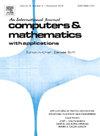基于机器学习的非线性桁架结构不确定性量化可靠度分析方法
IF 2.9
2区 数学
Q1 MATHEMATICS, APPLIED
引用次数: 0
摘要
桁架结构通常包含大量相似的构件;因此,有必要采用能够处理高维问题的可靠度分析算法对桁架结构进行可靠度分析。此外,当考虑材料特性和几何形状的非线性行为时,开发这样的算法是具有挑战性的。为此,本研究提出了一种名为t-LQR的新方法,该方法结合了三个领域的进展:i)来自机器学习的高性能梯度增强模型,以获得高精度的预测模型;ii)来自可靠性分析的主动学习过程,以自适应地改进预测模型;iii)来自概率信息的分位回归,用于不确定性量化,以识别用于改进预测模型的相关候选者。通过平面和空间桁架结构验证了该方法的有效性和鲁棒性,结果表明,与传统的蒙特卡罗方法相比,t-LQR显著减少了结构分析的计算时间,最多可减少25倍。此外,就非线性问题的精度而言,t-LQR优于基于kirking的竞争模型。本文章由计算机程序翻译,如有差异,请以英文原文为准。
Efficient reliability analysis method for non-linear truss structures using machine learning-based uncertainty quantification
Truss structures typically involve a large number of similar elements; hence, it is necessary to employ reliability analysis algorithms that can handle high-dimensional problems to analyze the reliability of truss structures. Moreover, when considering non-linear behaviors in terms of both material properties and geometry, developing such an algorithm is challenging. For this purpose, this study proposes a novel method, named t-LQR that combines the advancements from three domains: i) a high-performance gradient boosting model from machine learning for a highly accurate prediction model, ii) an active learning process from reliability analysis for adaptively improving the prediction model, and iii) quantile regression for uncertainty quantification from probabilistic information to identify the relevant candidates used to refine the prediction model. The validity and robustness of the proposed method are verified through planar and spatial truss structures, showing that t-LQR significantly reduces the computational time of structural analysis-up to 25 times-compared to the conventional Monte Carlo methods. Furthermore, t-LQR outperforms competing Kirging-based models in terms of accuracy for non-linear problems.
求助全文
通过发布文献求助,成功后即可免费获取论文全文。
去求助
来源期刊

Computers & Mathematics with Applications
工程技术-计算机:跨学科应用
CiteScore
5.10
自引率
10.30%
发文量
396
审稿时长
9.9 weeks
期刊介绍:
Computers & Mathematics with Applications provides a medium of exchange for those engaged in fields contributing to building successful simulations for science and engineering using Partial Differential Equations (PDEs).
 求助内容:
求助内容: 应助结果提醒方式:
应助结果提醒方式:


